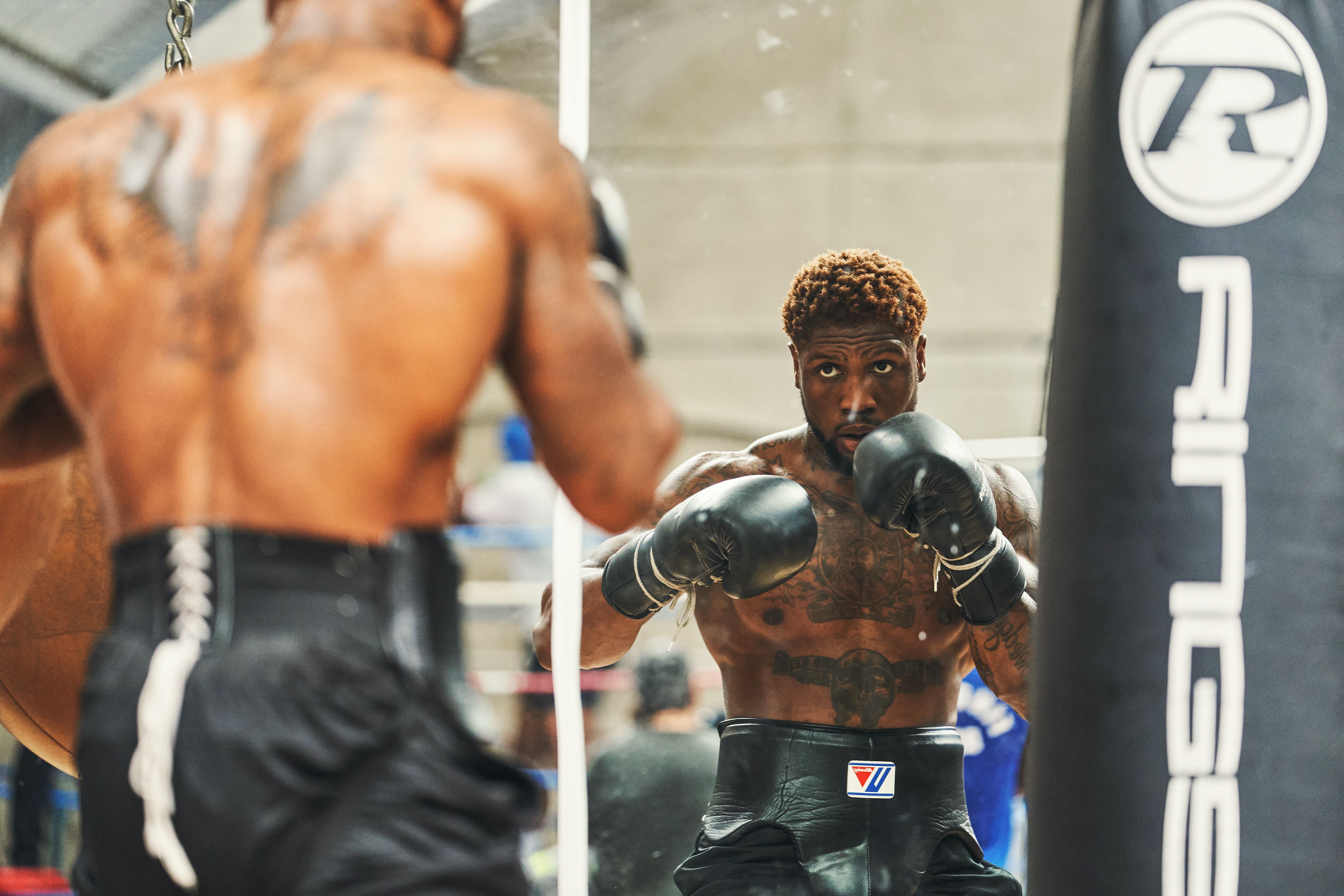
Self Reflection: Finchley Boxing Club, as seen on the pages of Issue 05.
Photographs & Words: Jane Stockdale
A left glove drives forward, fracturing a jaw made of air. A pause, then an exhaustive exhale settles in the recoil. Look at me, the eyes seem to say, is that all you have? I’m watching you watch me, and I move like you in every way. You’re faster, you say? Everything you give, I can take. The result is always a draw. We are one and the same. You stare at yourself in the mirror, positioned in guard. Gloved hands at the ready. What do you say to yourself? You exist in two worlds: one of your own reality, and one beyond this perfect pane of glass, where your sharp left is transformed into a right. Here, you cannot beat yourself, but you may lose. Perhaps in this world of reverse, doing so is the ultimate goal. Somewhere in there, you understand yourself a little better: your body’s tendencies, the gaps between your jabs, and the preci-sion of your patterned footwork. Something is lost with every strike – but something else is gained. This conversation inches towards an idea of what is fixed, and what can be. How you can become a better boxer, just by examining yourself. There is no other body to fight: one plays the part of two, the mirror moves to tell its own truth. A boxer spends less time in actual competition with an opponent than you might think. In fact, a great deal of their time is spent fighting themselves - often, combatting their reflection in a mirror. Looking themself up and down, scouring for weakness, holes in their own defence or plotting their next series of jabs. The practice of shadow-boxing is among a fighter’s sharpest tools, wielded closely in the process of uniting the forces of mind and body. A historical dichotomy – two properties supposed to be in perpetual conflict with one another – bleeding through a reflection, the ducking of each jab inches this separation to a close. Shadowboxing describes throwing punches into thin air, whilst simul-taneously evading the very same strikes as if fighting a physical opponent. These highly skilled and frequently practiced movements become ingrained in the individu-al’s physiology, to the extent that they no longer represent abstract knowledge, but serve as a library of physical capacities, ready to be drawn upon as the boxer enters the ring. Photographer Jane Stockdale recently spent time at Finchley Amateur Boxing Club, captivated by the club and its dedicated athletes. From speaking to star members like world heavyweight champion, Anthony Joshua, to head trainer Sean Murphy, Jane began to learn about what truly motivates a boxer. From an array of emerging talents who spend hours fighting themselves in front of the mirror, Jane has collected their insights for Good Sport.
Patricia Mbata, 26 years old. Focused on earning Team Great Britain selection – 9-2
“Sean always says to me, ‘Stop being so nice to them. Stop trying to be their friend.’ Outside the ring, I’m a friendly person. [But] when you’re there [in the ring], you switch on, and you turn into this other character ... this other side of you. I don’t mean it - but for the duration of the fight, I don’t like you; I hate you. I’m going to beat you. I’m going to stop you. I’m going to make you quit.
As soon as it finishes, we’re all hugging and smothering each other.
“A lot of boxing is psychological – you know you’re ready, you know you’ve worked for it, you know you’ve tucked away. You get this tingling sensation. ‘It’s game day now’. “[In the ring] I’m listening to Coach.
Sometimes you get a wild crowd, and you can’t hear anything. But for some strange reason, you can tunnel your coach’s voice and just hear what he’s saying. If I’m doing something wrong and he says, ‘Sharpen up. Double up the jab.’ I can hear his voice above everyone else.”
“Sean always says to me, ‘Stop being so nice to them. Stop trying to be their friend.’ Outside the ring, I’m a friendly person. [But] when you’re there [in the ring], you switch on, and you turn into this other character ... this other side of you. I don’t mean it - but for the duration of the fight, I don’t like you; I hate you. I’m going to beat you. I’m going to stop you. I’m going to make you quit.
As soon as it finishes, we’re all hugging and smothering each other.
“A lot of boxing is psychological – you know you’re ready, you know you’ve worked for it, you know you’ve tucked away. You get this tingling sensation. ‘It’s game day now’. “[In the ring] I’m listening to Coach.
Sometimes you get a wild crowd, and you can’t hear anything. But for some strange reason, you can tunnel your coach’s voice and just hear what he’s saying. If I’m doing something wrong and he says, ‘Sharpen up. Double up the jab.’ I can hear his voice above everyone else.”
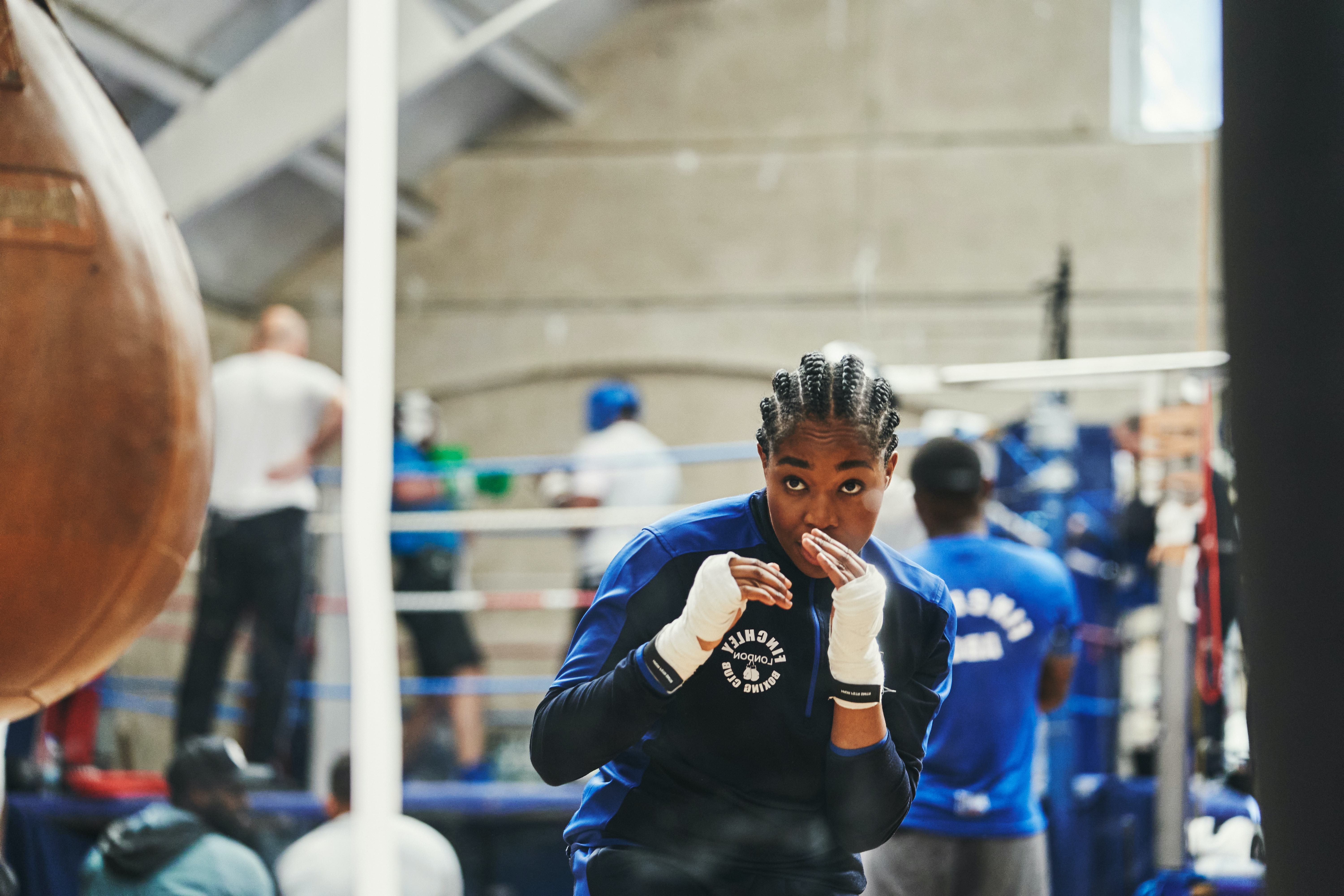
‘...the main thing is, the boxer I was when I started is not the boxer I am now.’
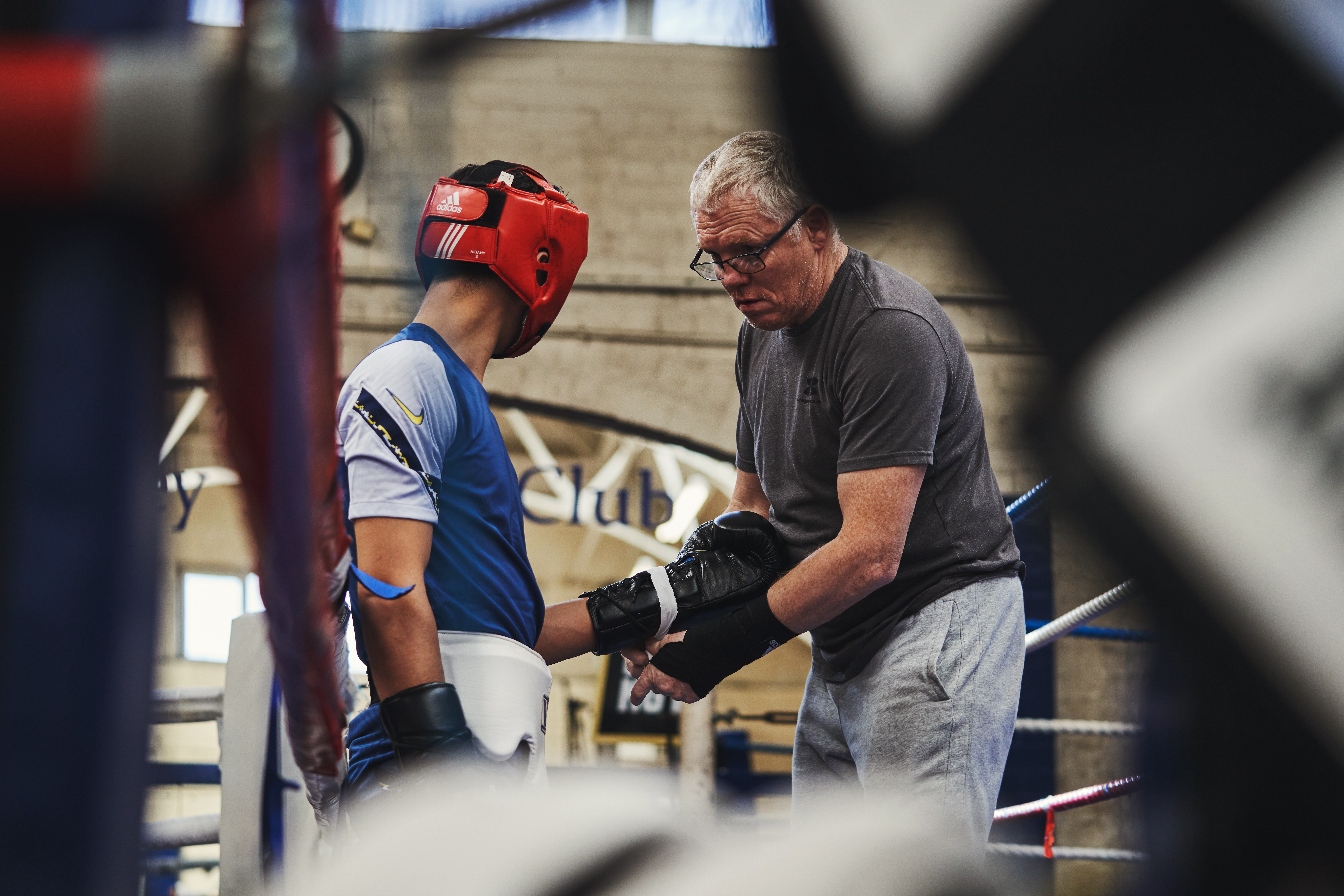
Sean Murphy, Former amateur and professional boxer represented England in 25 bouts, Commonwealth Games Gold Medallist and now Head Trainer of Finchley Amateur Boxing Club – 73-13
Walking into his first gym as a twelve-year-old, Sean knew that he had to “hold his hands up” and on that opening evening, Sean went straight into the ring to spar. After just six weeks, he was competing — instantly falling in love with the sport. ! When I boxed, I was one of them who didn’t give a fuck. In my head, I weren’t going to get beat. No one can beat me. That’s how I fought. That’s what I was brought up to think, and I don’t feel no pain. In 1986, Sean went to the Commonwealth Games in Edinburgh and won a gold medal. He turned professional, won 22 fights out of 27, boxed for a feather-weight world title, won a Lonsdale Belt and a British title. In 1993, Sean retired and had a three year break.
During that time he trained his son and daughter at home – both going on to see a number of wins and earning a place on the card in Las Vegas bouts. As well as coaching the FABC fighters, Sean is the trainer of WBA, WBO, and IBF cham-pion boxer, Anthony Joshua.
Walking into his first gym as a twelve-year-old, Sean knew that he had to “hold his hands up” and on that opening evening, Sean went straight into the ring to spar. After just six weeks, he was competing — instantly falling in love with the sport. ! When I boxed, I was one of them who didn’t give a fuck. In my head, I weren’t going to get beat. No one can beat me. That’s how I fought. That’s what I was brought up to think, and I don’t feel no pain. In 1986, Sean went to the Commonwealth Games in Edinburgh and won a gold medal. He turned professional, won 22 fights out of 27, boxed for a feather-weight world title, won a Lonsdale Belt and a British title. In 1993, Sean retired and had a three year break.
During that time he trained his son and daughter at home – both going on to see a number of wins and earning a place on the card in Las Vegas bouts. As well as coaching the FABC fighters, Sean is the trainer of WBA, WBO, and IBF cham-pion boxer, Anthony Joshua.
Sean shared the following story about Anthony – a testament to Sean’s passion for developing good fighters that are good people too. When Josh won the world title, and we was at the hotel, it [brings] a tear to your eye... Thinking, do you know what, I looked after this kid, and look where he is now. Even people whose kids come in the gym, and they’re proper horrible little shits, out of the street. When they leave the gym, or after say like five or six years of training with someone, and you see that kid mature and grow, and become the person they are. And, you think to yourself, ‘Do you know what? I’ve influenced them. The way they turned out. And it’s lovely doing it. In boxing, I can just take someone on the pads, and nine times out of ten, I know whether they’re going to do something or not.
And I’m not looking for a world champion; I just want everyone to be equal in Finchley Boxing Club.
The most important thing [in boxing] is balance; get the footwork right, because your punching power and everything comes off that. It’s also about having the proper techniques and tactics. It’s mental strength. Some kids need to be nurtured, and you have to bring them along, while other kids have got all of the confidence in the world. If you’re facing someone who’s as strong or stronger than you, you’ve got to use your boxing brain to box them in and out – in spurts. That’s the science of the sport. You look at some kids shad-owboxing, and you know they’re just going through the motions. But [the key to shadowboxing is that] you’ve got to imagine someone is in front of you, and certain punches are coming at you while you’re defending. It’s mind over matter. [Say] if I’m boxing someone who’s really strong and I shouldn’t beat him ... but if I get the tactics right and change my style, then I can win. If you tell yourself that you can do something, you will do it. I feel like half the battle with boxing is having that confidence.”
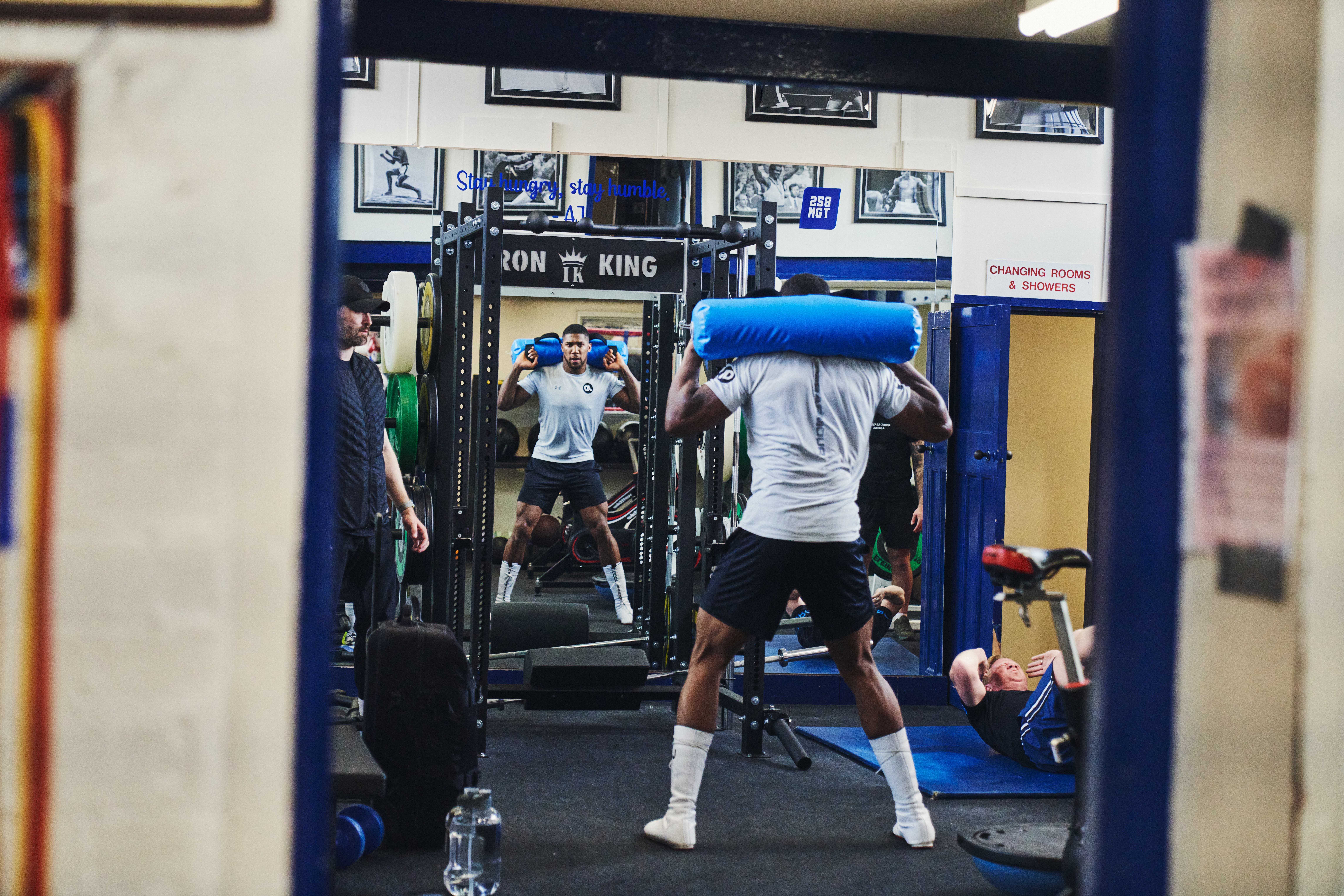
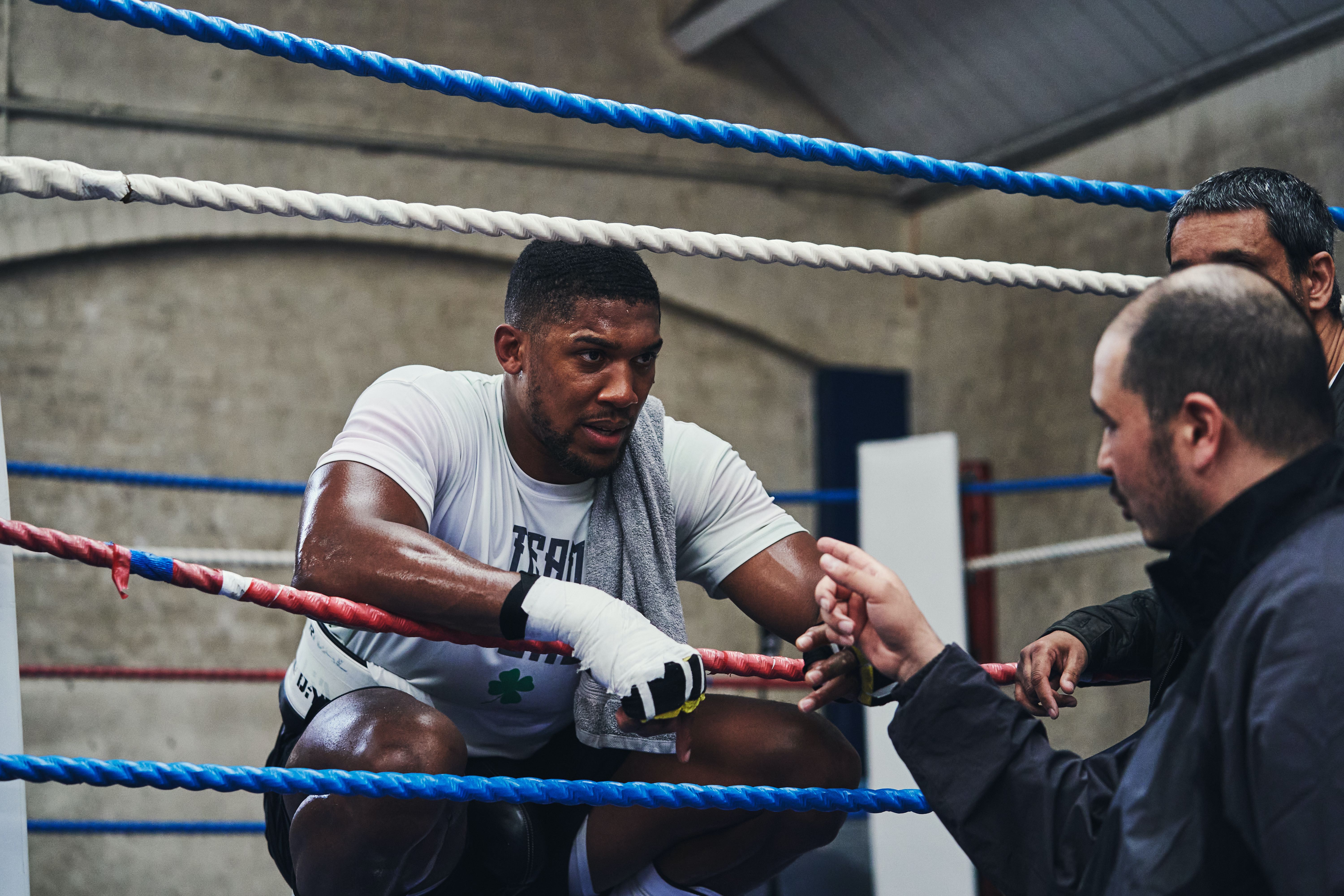
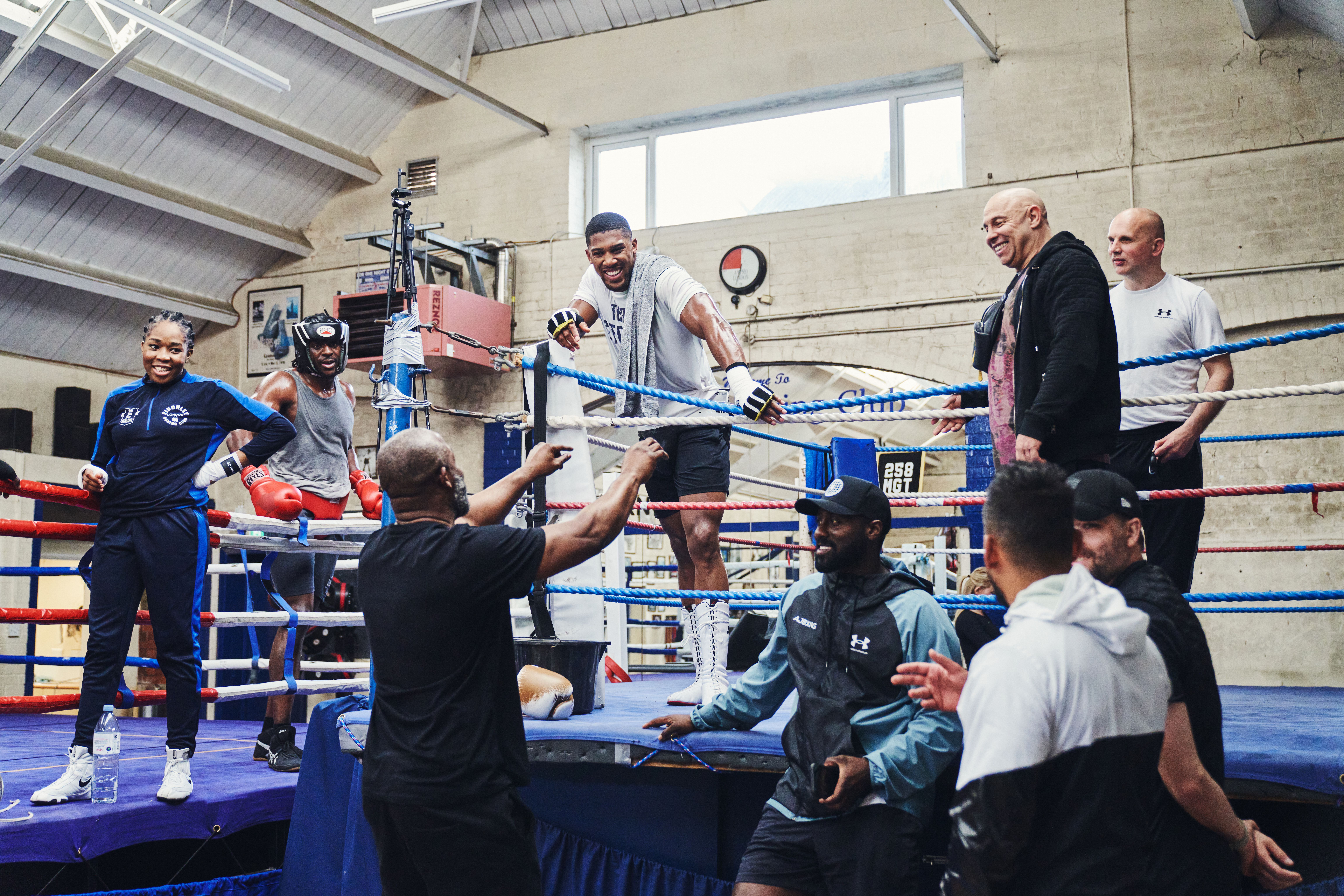
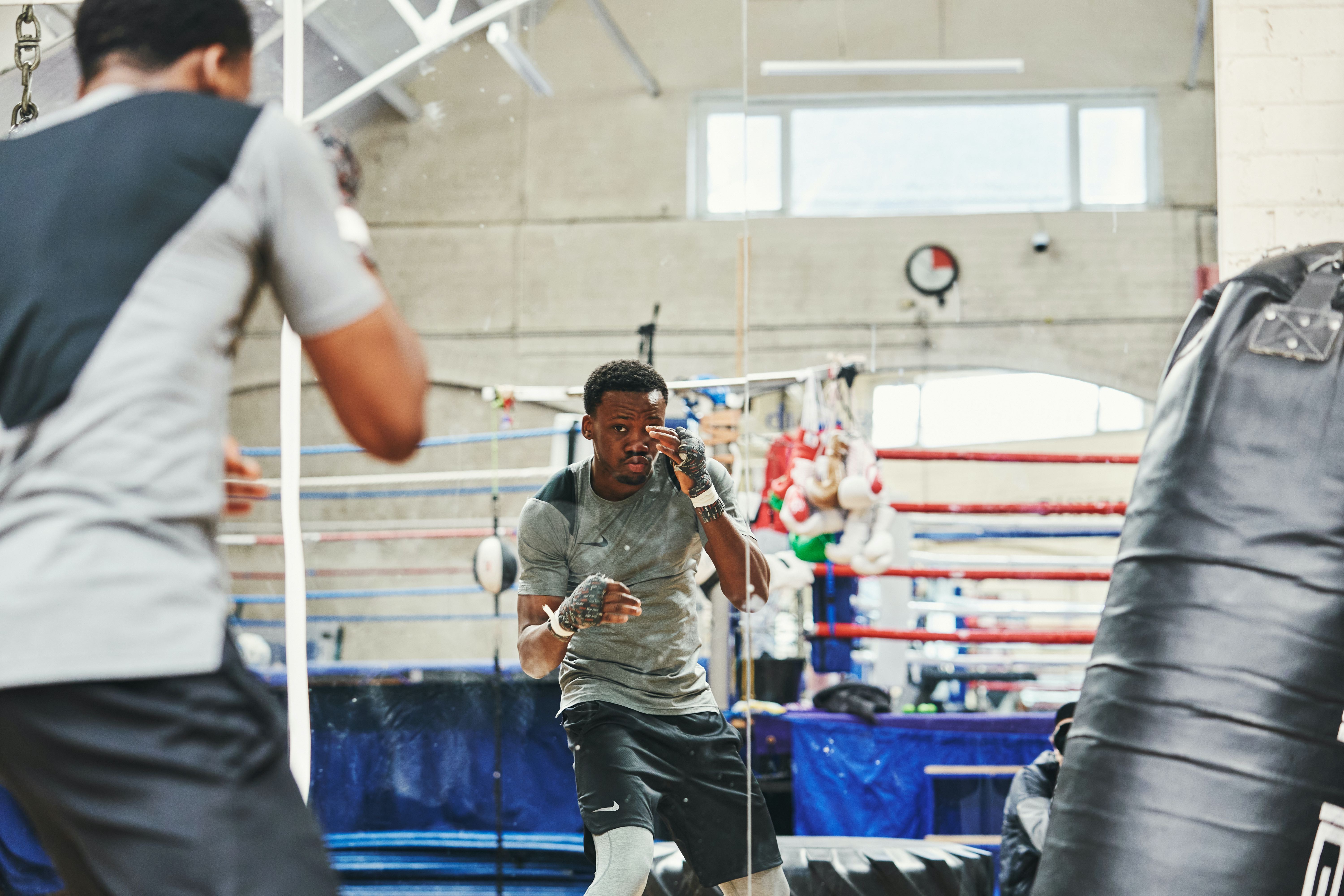
Jesse Brandon, 24 years old. Currently amateur, aiming to be professional – 11-14
“I’ve won a couple of fights. I’ve lost a couple. But the main thing is, the boxer I was when I started is not the boxer I am now. I’m far better. It’s not about who’s knocking the amateurs; it’s about your progression.
Boxing’s taken me places I’ve never thought I’d ever go in my life. I’ve been to Dover, Devon… all these other provinces out of London. [It’s] made me a better person. It’s made me more disciplined, and I control my temper more. I think more. When I train, [there are] no issues. Boxing makes me forget about all my problems.”
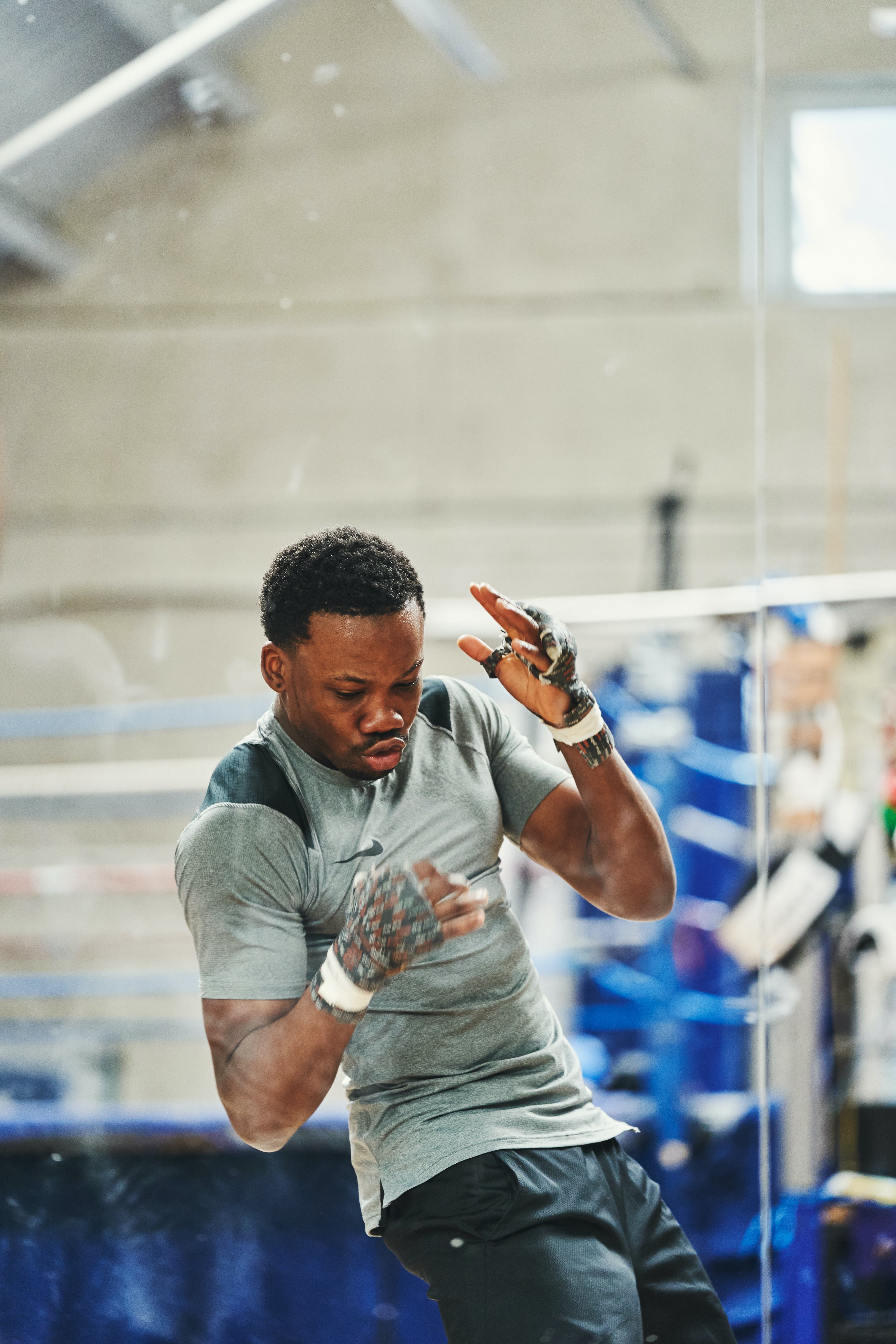
‘Okay, I got hit. What do I need to do to not get hit again?’
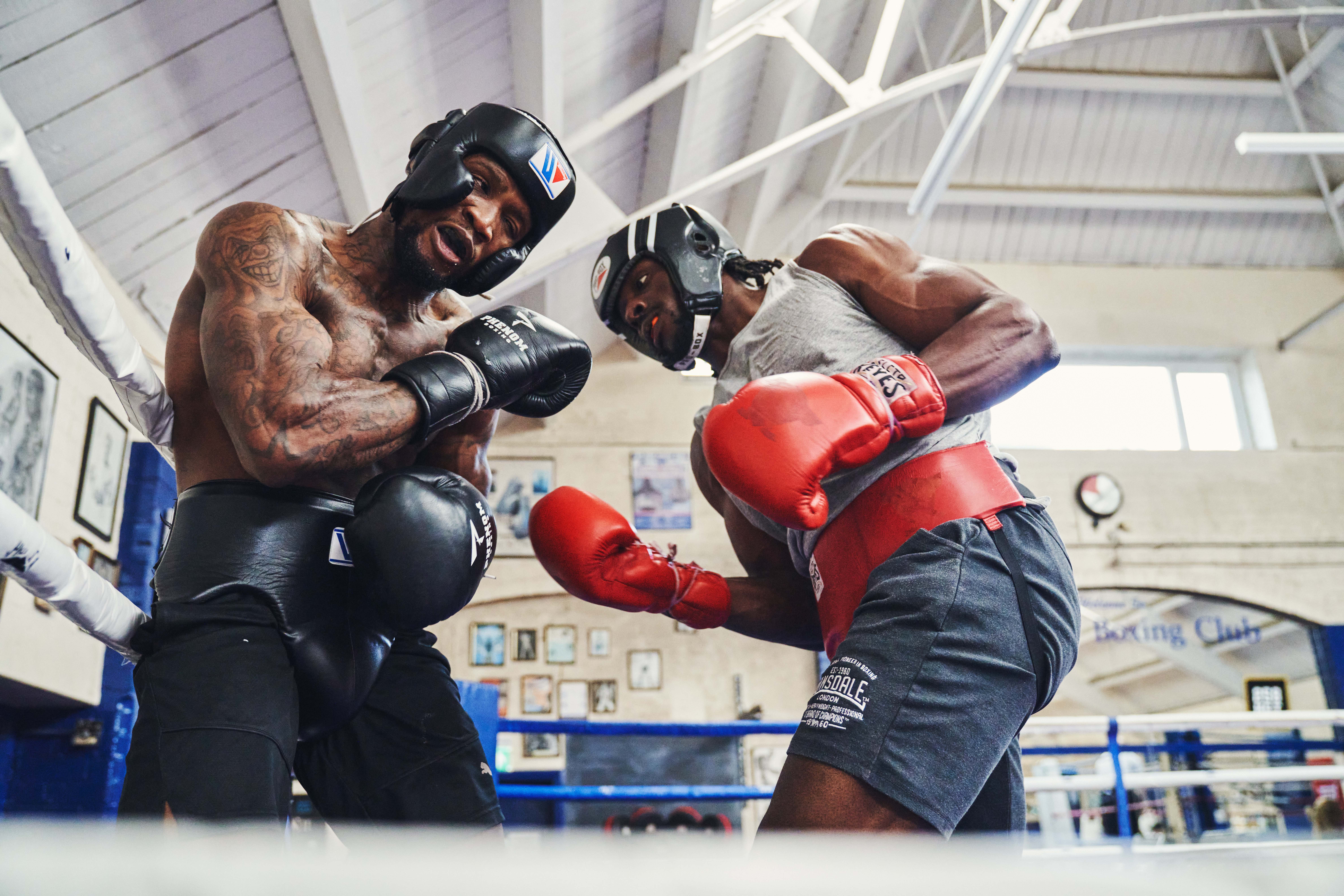
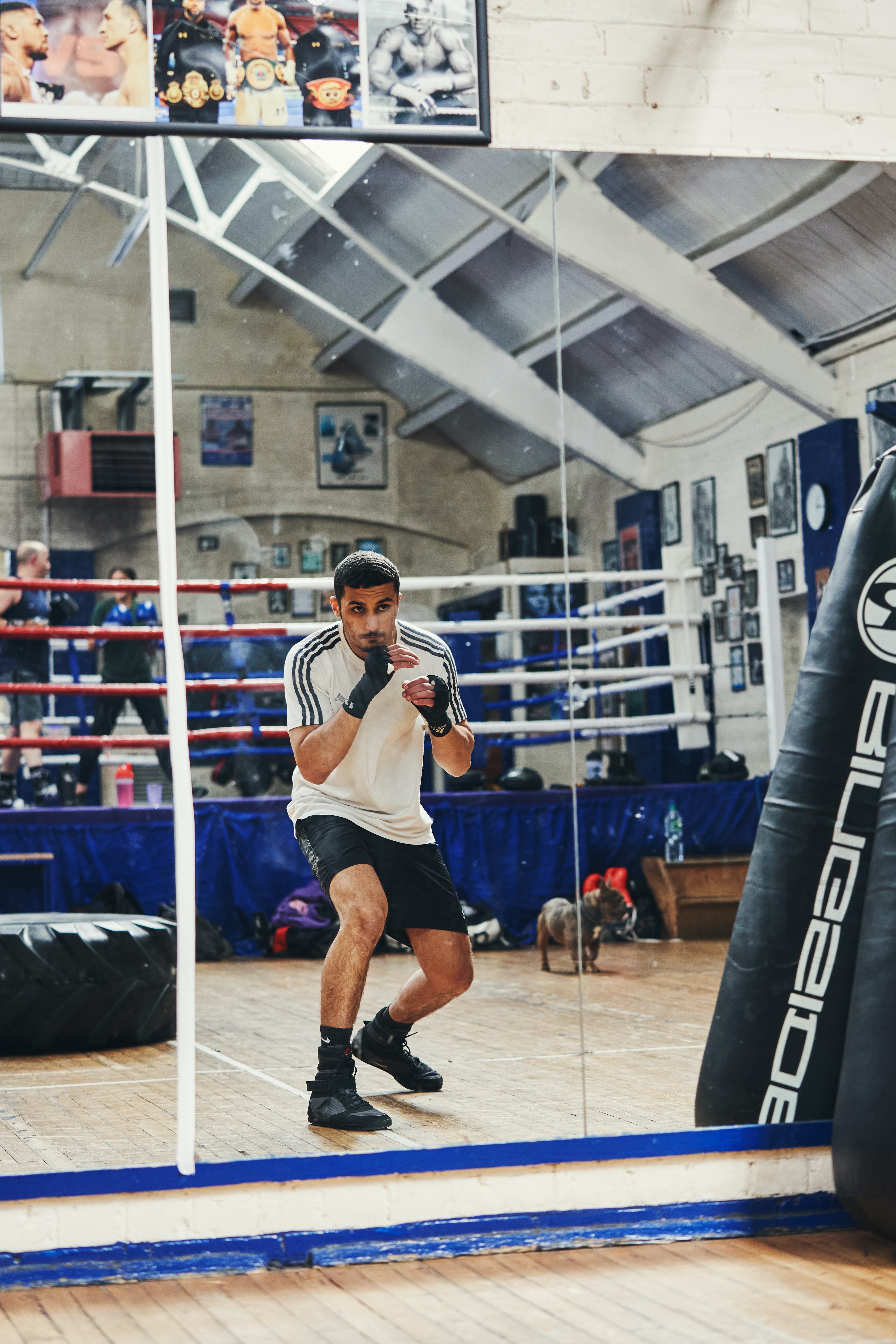
Omar Chaima (Pictured Left), 22 years old. Amateur (London Champion, 2 x Schoolboy Champion, Boxing Club Champion) – 38-20-10
“Most of it is [about] how you mentally deal with punches. Some people might take a jab to the head, start getting frustrated, and charge at their opponent in anger. Whereas some people just brush it o! [and think], ‘Okay, I got hit. What do I need to do to not get hit again?’ How hard do you want to work? How hard do you like it? Maybe you’re home, and you don’t want to go for a run, but you have to try and force yourself into it. It’s 90% of the work.
Boxing is serious, but you can use it as a form of meditation; like the gym, people use it to get away from outside life. When I’m in the ring, there’s more [to it] than just trying to get in my movement and get out of the way. I’m using the whole ring, getting my footwork right and moving my head. And then when I’m down by the mirror, I focus on the punches. If I’m throwing a jab, I can see if my movement is correct. Am I not twisting enough? Am I over-leaning? What else would someone throw? If you’re looking in the mirror, it’s like you’re facing your opponent.”
![]()
![]()
“Most of it is [about] how you mentally deal with punches. Some people might take a jab to the head, start getting frustrated, and charge at their opponent in anger. Whereas some people just brush it o! [and think], ‘Okay, I got hit. What do I need to do to not get hit again?’ How hard do you want to work? How hard do you like it? Maybe you’re home, and you don’t want to go for a run, but you have to try and force yourself into it. It’s 90% of the work.
Boxing is serious, but you can use it as a form of meditation; like the gym, people use it to get away from outside life. When I’m in the ring, there’s more [to it] than just trying to get in my movement and get out of the way. I’m using the whole ring, getting my footwork right and moving my head. And then when I’m down by the mirror, I focus on the punches. If I’m throwing a jab, I can see if my movement is correct. Am I not twisting enough? Am I over-leaning? What else would someone throw? If you’re looking in the mirror, it’s like you’re facing your opponent.”
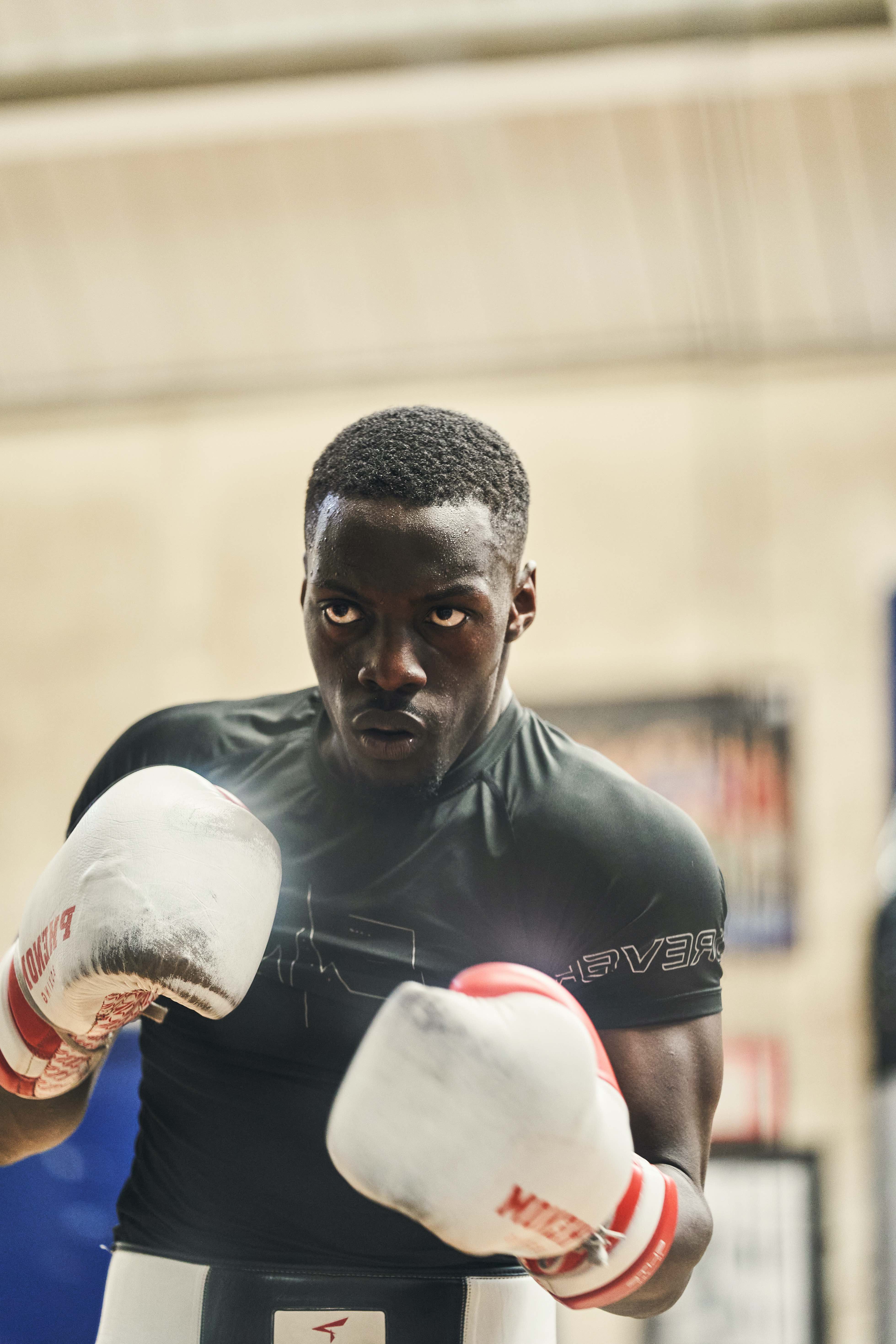
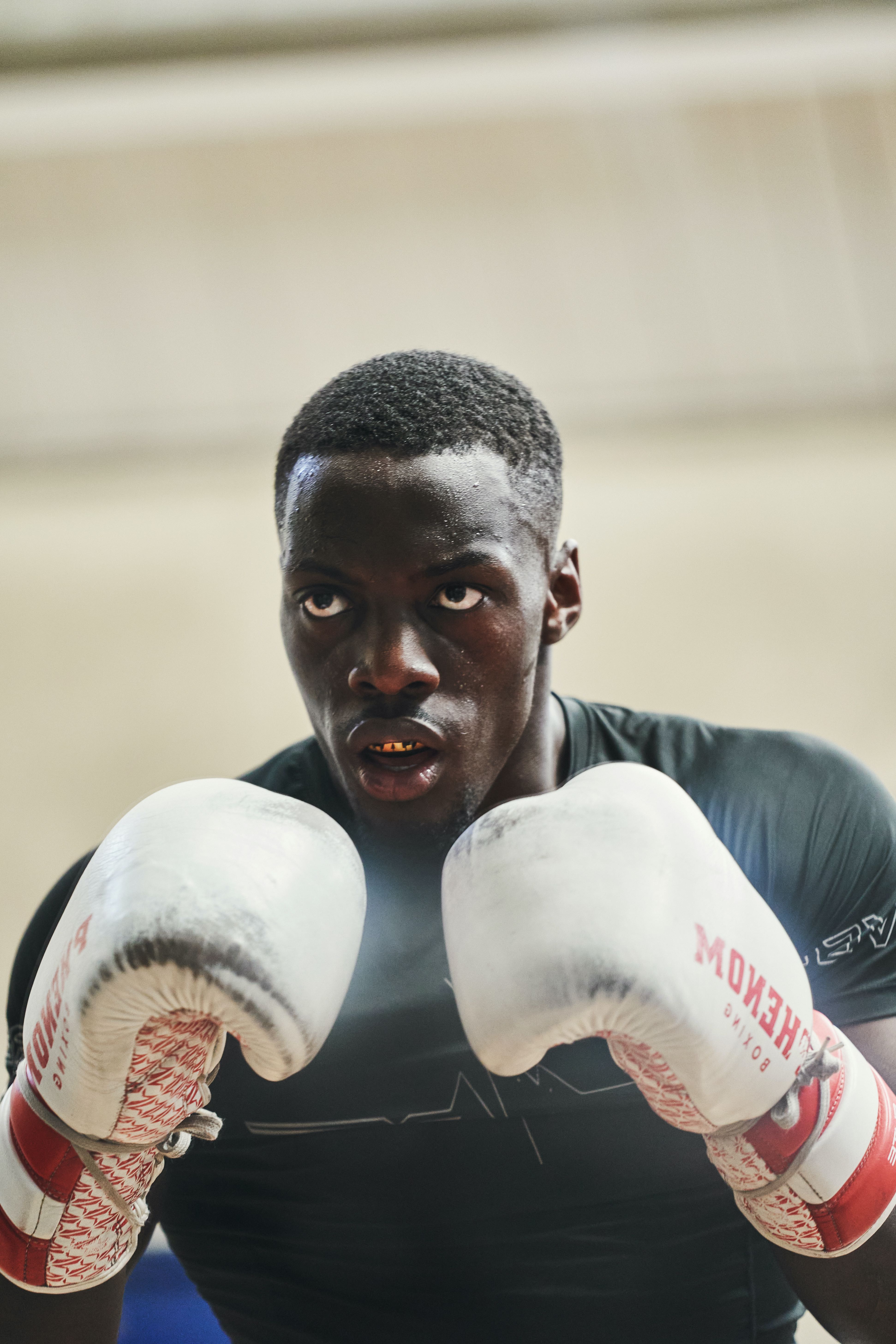
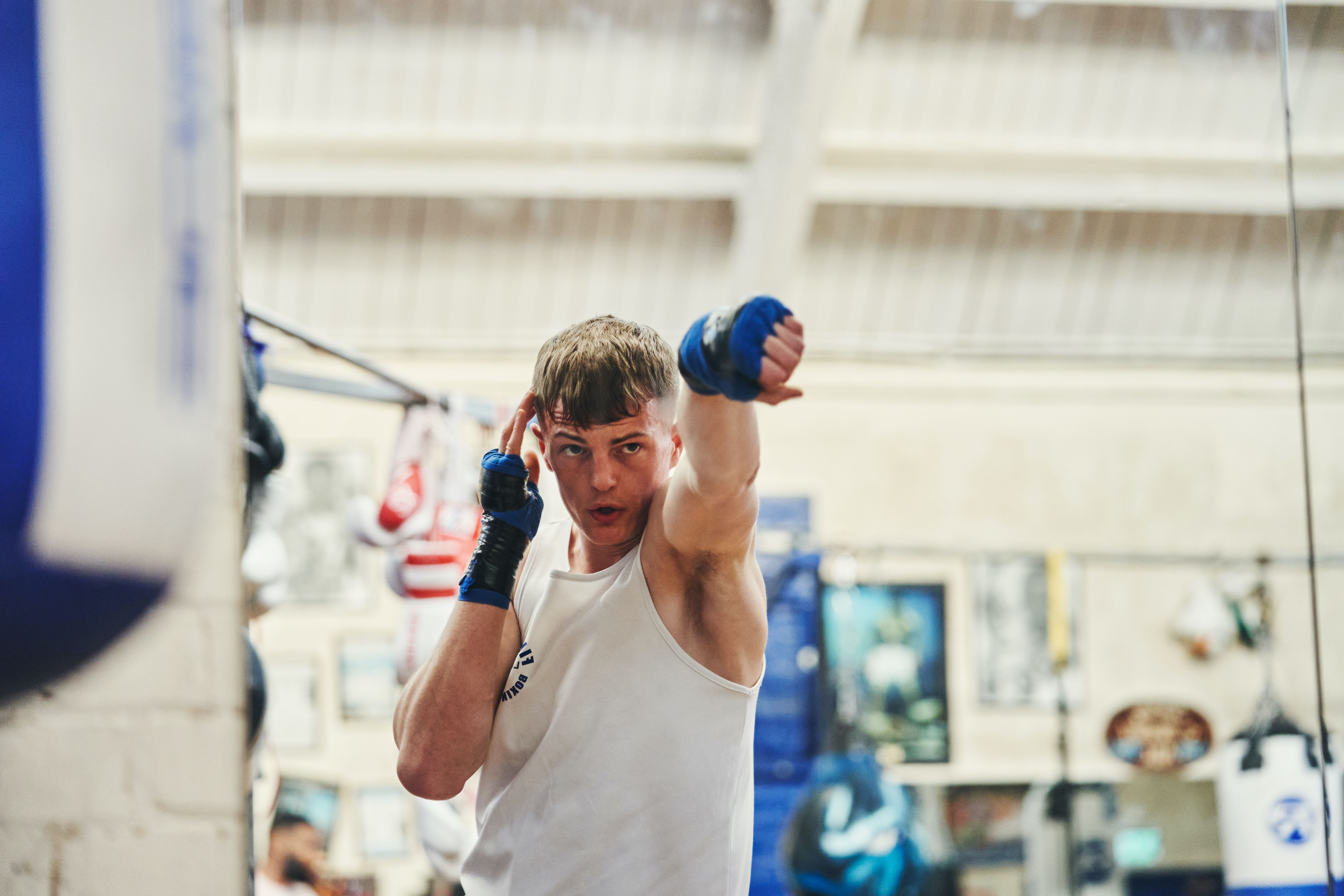
Tom Hunter, Amateur. Kickboxed for 7-8 years and travelled around Europe before switching to boxing – 12-7
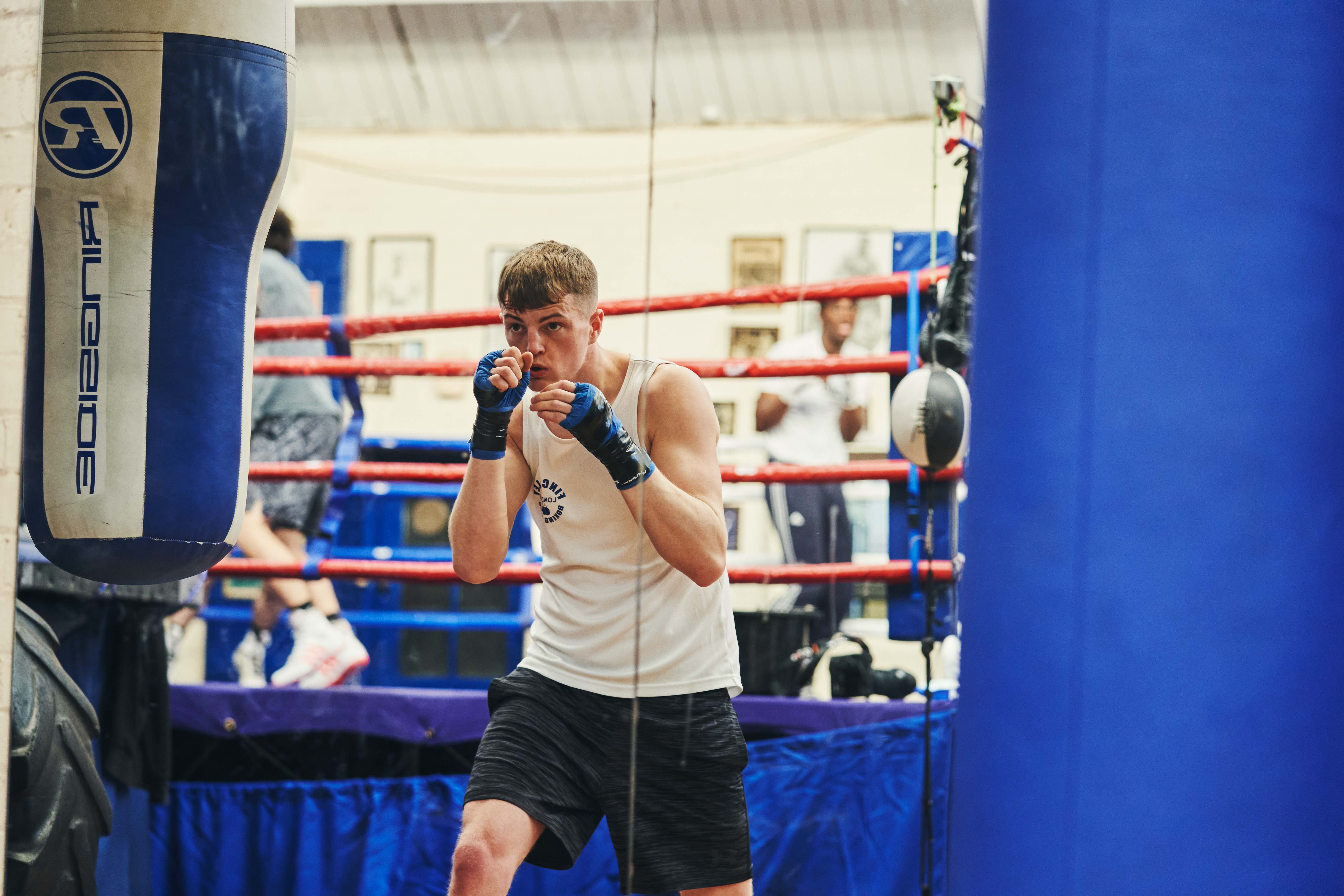
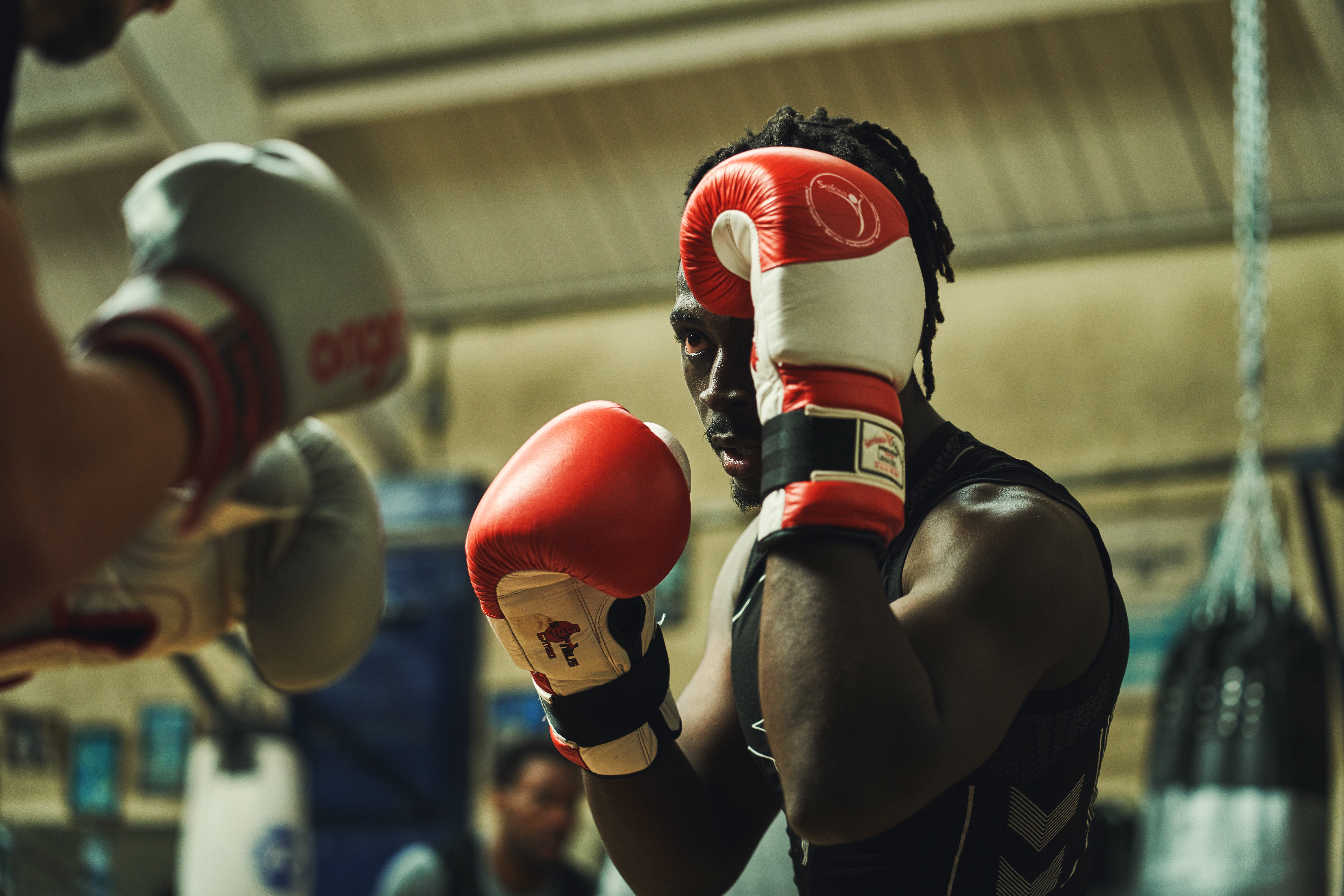
Joshua Luther, 23 years old, Former football player, now a solid boxing prospect – 2-1
“Boxing has taught me a different style of discipline. You would think boxing’s more [about] aggression and overpowering somebody, [but it has] taught me how to channel that aggression mentally, rather than just focusing on the physical side. The biggest part of it is the mental side. It’s really helped me understand that, not just in boxing, but in life. There are a thousand and one things going on in your mind when you’re in the ring. [But] the best quote I have for it is, ‘trying to find peace in the chaos.’ It’s difficult, but the more you do it, the more comfort you find in it. Once you slow it down in your mind, your body can react to it better, rather than being overwhelmed. You have to shadowbox [in the same way] you would fight. That’s what I’m trying to master at the moment. I still don’t think I’ve found myself as a boxer. I’m still learning the foundations day by day, and I need to find my style and rhythm. That’s what I’m trying to do when I’m shadowboxing.”
Purchase a copy of Issue 05 here.